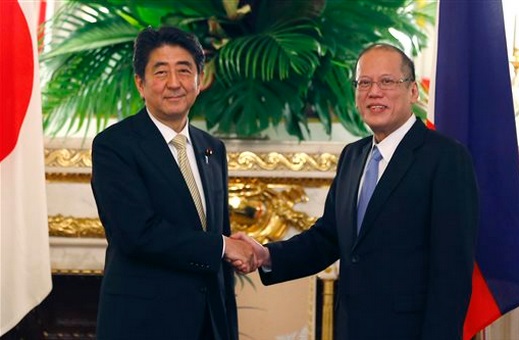
President Aquino, right, and Japan’s Prime Minister Shinzo Abe shake hands during a signing ceremony after their meeting at the Akasaka Palace state guesthouse in Tokyo on Thursday, June 4, 2015. Under the strategic partnership agreement signed Thursday between Aquino and his Japanese host Abe, the two countries will begin military equipment transfer talks that may include anti-submarine reconnaissance aircraft and radar technology. KAZUHIRO NOGI/POOL PHOTO VIA AP
TOKYO—The Philippines and Japan on Thursday signed a joint declaration enhancing their defense ties amid threats to regional peace posed by China’s increasing assertiveness in the South China Sea.
RELATED STORY: Japan envoy apologizes to PH for WW2
After wide-ranging summit talks at Akasaka Palace in Tokyo, President Aquino and Japanese Prime Minister Shinzo Abe signed the declaration deepening the strategic partnership between the Philippines and Japan, agreeing to begin talks for an arms deal, joint training exercises, and ensuring “maritime safety and security” in the heavily disputed waterway.
The five-page declaration, bolstering the strategic partnership the two nations signed in 2011, also covers stronger “collaboration for economic growth” in the Asia-Pacific region and the pursuit of “enduring peace” in Mindanao.
A major part of the declaration covers stronger defense ties between the two countries, including the “initiation of negotiations to conclude an agreement on the transfer of defense equipment and technology.”
READ: Japan to discuss military exports to Philippines
A Japanese media report said that P-3C antisubmarine reconnaissance aircraft and radar technology were possible sale items under the declaration.
A sale of the P-3C, originally designed by Lockheed Martin Corp. and produced in Japan by Kawasaki Heavy Industries from 1978 to 1997, would be Japan’s first full-fledged military export since Tokyo lifted its restrictions on military exports last year.
Aquino has actively courted Japan, along with the United States, to help serve as a counterbalance to China’s claims to almost the entirety of the 3.5-million-square-kilometer South China Sea, including waters within the exclusive economic zone of the Philippines and other Southeast Asian countries.
China island-building
China has been aggressively building artificial islands, including what appear to be military-supporting facilities, such as runways, around disputed reefs in the Spratly archipelago, a group of islands in the middle of the South China Sea that is believed to be home to vast oil and gas reserves.
The United States, apparently supporting its treaty allies, has demanded an “immediate and lasting halt” to China’s land reclamation in the Spratlys.
Besides the Philippines, Brunei, Malaysia, Vietnam and Taiwan have overlapping claims with China in the South China Sea.
Japan is also locked in dispute with China in the East China Sea over five uninhabited, Tokyo-administered islands known to the Japanese as the Senkakus and to the Chinese as Diaoyus.
China has declared an air defense identification zone over the Senkakus, but Japan, the United States and other countries have rejected the declaration, with Washington challenging Beijing’s claim with military flights to the area.
Capacity building
Coming at a time when Japan is rethinking its pacifist policy in the face of growing regional threats, the joint declaration with the Philippines also provides for the “expansion of bilateral and multilateral trainings and exercises for capacity building in areas including those covered by the memo on defense cooperation and exchange.”
In his remarks at a joint news conference with President Aquino, Abe issued an unequivocal condemnation of China’s land reclamation in the South China Sea, including on reefs claimed by the Philippines.
“We once again confirm that we share serious concern about the large-scale land reclamation, and that we oppose attempts to unilaterally change the status quo,” Abe said.
He also again expressed support for the arbitration case the Philippines had initiated in the United Nations against China for a peaceful resolution of the territorial dispute.
“We also agreed to thoroughly uphold the principle of the rule of law, and I once again conveyed our support for the utilization of the arbitration procedures by the Philippines,” he added.
‘Act responsibly’
Indirectly referring to China, President Aquino asserted the commitment of the Philippines and Japan to urging other countries “to act responsibly” given “security challenges that confront both our nations.”
“We believe this can be done through finding just and peaceful solutions to our territorial disputes and maritime concerns by upholding the rule of law, toward creating a secure and stable environment that serves as the bedrock of our collective progress,” Aquino said.
In the declaration, the Philippines and Japan reaffirmed “their strong commitment to ensuring maritime safety and security,” including in the South China Sea, which is a vital element for peace and prosperity in the region.
Both countries also reiterated their commitment to freedom of navigation.
“Both countries reiterate their resolve to contribute to peace and stability in the international community. . . . Maintaining open and stable seas is essential in ensuring regional stability and is an imperative issue which both countries, as maritime nations,” the declaration said.
Rule of law
Amid continuing Chinese incursions in disputed waters, the declaration issued a common call for coastal states to “refrain from unilateral actions that would cause permanent physical change to the maritime environment in areas pending final delimitation.”
The two sides also underscored “the importance of [the] peaceful settlement of maritime disputes based on international law,” such as the UN Convention on the Law of the Sea.
The Philippines is invoking the same treaty in urging China to stop its incursions in the South China Sea, resting the thrust of its arbitration case on this international law.//WITH REPORTS FROM AP and AFP
Disclaimer: The comments uploaded on this site do not necessarily represent or reflect the views of management and owner of Cebudailynews. We reserve the right to exclude comments that we deem to be inconsistent with our editorial standards.
